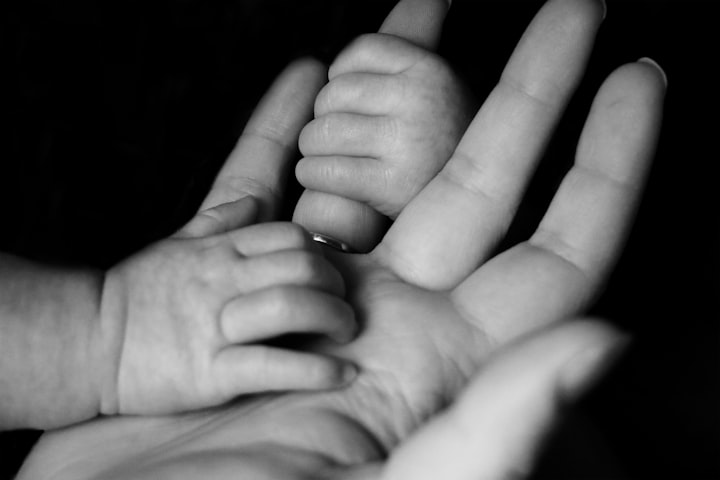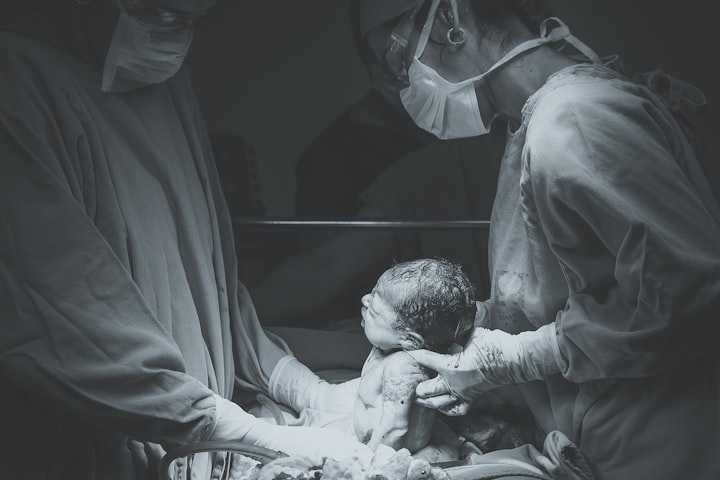The Transformative Power of Forgiveness
Learning from my mother by facing the truth
"Bobby, she never even held her when she was a baby," I overheard my father's sister say to him one night. They were outside on my aunt's deck, drinking and catching up late into the night, after over a year of not seeing each other. They thought I had fallen asleep, but I laid awake in the guest bed, listening to them reminisce about when my father was still married to my mother. I tried not to eavesdrop, but they were revealing answers to questions I had most of my life. No one ever told me why my parents split not long after I was born. In fact, neither of them ever mentioned the divorce and rarely mentioned the other. Despite the rupture to life as I knew it and the jolting accumulation of two different homes, they acted as though everything was normal.
My aunt's words stung, and yet oddly offered me relief. While they may not have painted the whole picture, as she only saw a fraction of my mother's and my time together, there was truth to them. They put words to a deep core attachment wound and confirmed what I had always felt to be true: every time I'd go to sit on my mother's lap as a young girl and she would push me to the side, telling me it was too hot or that my bottom was too boney; every time I'd ask her to rub my back when she'd come to tuck me into bed and she'd acquiesce for a minute, before making an excuse to exit the room. A single mother, a single daughter, alone in a new, big, quiet house, I'd often crawl into bed with her. I'd reach out for her arm to snuggle up in, and, like clockwork, she would pull away and roll over, leaving me to wonder whether I felt more alone in the empty bed I had left or lying next to her. The harsh truth, finally voiced by my aunt, was a missing piece to the puzzle of healing my learned survival strategies I had been actively piecing together for four years.
The next morning, I confronted my aunt about the comment. "Oh no," she cried, distressed and covering her face with a hand. "You weren't supposed to hear that." I encouraged her to tell me more, letting her know I was okay and that I already had similar suspicions. She explained to me that my mother may have suffered from postpartum depression, less commonly talked about let alone treated three decades ago. I imagined how lonely she must have felt, being in a failing marriage with a husband she couldn't talk to and who didn't support her. My empathy didn't take away all of my pain, but it did help me feel compassion for this strong, cold woman. It took time, but forgiveness and even gratitude eventually followed.
In her book The Heroine's Journey, a critical feminist approach to Joseph Campbell's well-known The Hero's Journey, Maureen Murdock writes, "[Many] fail to see their mother's life in the context of the historical period in which she lived, her family background, and the opportunities that were available to women at that time. Her failings become internalized as part of the inner negative mother" (19).
Born in 1958, my mother was the oldest of five children and a first-generation college graduate. Her mother became a widow and the head of her large household at the young age of 43, never remarrying. Though the powerhouse matriarch produced three strong-willed matriarchs in their own right, I imagine it was difficult for my mother’s siblings to live in the shadow of her accomplishments (as it was for her only child). Only one of the other four children—the youngest, 12 years younger than my mom—graduated college.
"Women have often been portrayed in our society as unfocused, fickle, and too emotional to get the job done. This lack of focus and clear differentiation in women is perceived as weak, inferior, and dependent—not only by the dominant culture but by many women as well. Women who seek success in the male-oriented work world often choose this path to dispel that myth. They seek to prove that they have good minds, can follow through, and are both emotionally and financially independent... They choose role models and mentors who are men or male-identified women and who validate their intellect, sense of purpose, and ambition and generate a sense of security, direction, and success. Everything is geared to getting the job done; climbing the corporate ladder; achieving prestige, position, and financial equity; and feeling powerful in the world. This is a heady experience for the heroine, and it is fully supported by our materialistic society, which places supreme value on what you do. Anything less than doing 'important work in the world' has no intrinsic value." (Murdock 6)
Shortly after her father passed away unexpectedly, my mother graduated from nursing school and met my father, a paramedic. She supported him by putting him through vocational school. They spent a lot of time together on the golf course. She enjoyed golfing—and especially competing—with the boys, insisted on teeing off from the men's tees, never wanting her victory to be underscored by advantage, and even treated everyone to a round of drinks after their rounds. A real ballbuster, she proved herself by exceeding set standards and shattering glass ceilings. Her powerful energy emasculated my less ambitious father, who was comfortable right where he was (and hated being challenged), though she never changed who she was. And most certainly never made herself smaller to make a man more comfortable—even if it cost her her marriage.
“If a woman feels alienated or rejected by her mother she may first reject the feminine and search for recognition by the father and the patriarchal culture... She first learns the dizzying games of the fathers, the strategies of competition, winning, and achievement. She tries to prove that she can live up to a standard designed by white men in their image. No matter how successful she is, however, she finds that she is still undervalued and overworked. She begins to question what happened to feminine values.” (26)
While my mother thrived in a man's world, I found it an inhospitable environment. I followed in similar footsteps but made compromises along the way to appease my father. For instance, I didn’t apply to the colleges I really wanted to go to knowing that, while my mom could afford them, he could not (and she made too much money for me to be eligible for financial aid). Later, after application deadlines had come and gone and it became clear she would be the sole financer of my higher education, I selected a school, degree, and career path she approved of, one that she felt could capitalize on my passion for writing. This path, journalism, eventually took me to the opposite end of the country, New York City, where I landed a glamorous job as a writer and editor. Like my mother, I found success following society’s rules. Unlike her experience, it never brought me fulfillment or a sense of purpose—nor did it offer the love and connection I always craved from her.
However, something happened while I was away. Putting the distance of an entire country between us gave me the space to make my own decisions and become my own person, no longer influenced by my mother’s approval or dependent on her support—financial, emotional, or otherwise. Taking responsibility for myself meant learning how to care for myself in ways that were completely new and foreign. I began trusting in and reparenting myself. In the process, our relationship transformed. She became my friend. In this shift, I let her off the hook for the ways she couldn’t show up for me. I was able to see my mother clearly and appreciate her for who she was, rather than who I always wanted her to be.
I also came to realize that she did the best she could and simply didn’t have the emotional capacity to love me the way I longed to be loved. I understood that she had her own needs that most likely weren’t met by her mother. From family stories, I knew for certain that my grandmother, the strong matriarch that widowed in her early 40s, had needs that weren’t met by her mother. At the suggestion of a mentor, I started looking closely at our family history, what the women in my family endured, and the context of the time periods they lived in. In healing myself, I began healing the ancestral trauma passed down my maternal lineage. I was finally able to appreciate the significance of my mother’s life choices in the greater context of feminism and women’s empowerment. While her and I are very different, she is still a powerful role model, not only for me but women in general.
"Some women find that their strivings for success and recognition have been predicated on pleasing parents... When they begin to look at their motivation, some have a hard time finding the parts of themselves that are their own" (7). In accepting my mother for who she was, meanwhile building up my capacity for self-love and care, I was able to choose a different path for myself. By this point, I had achieved everything she—and society, for that matter—told me I should do or have in order to be happy, and yet it didn’t feel right. Something was missing: me. I made the difficult decision to come home and start my life over, from scratch.
Fortunately, my pain had led me on a healing path of yoga that became my purpose. While I never had ambitions of becoming a yoga teacher, I was committed to healing through learning and growing. I didn’t always know where this path was leading me but I took it step by step until it unfolded before me: to Santa Cruz, where I started my initial 200-hour training; to Costa Rica, to begin my advanced 300-hour certification; to Guatemala, where I learned how to use yoga in seva, or service, of others; to Bali, where I was first introduced to The Heroine’s Journey and started the process of forgiving my mother; to India, on pilgrimage where I confronted this childhood abandonment wound head on; and ultimately to Loyola Marymount University (one of the colleges I initially dreamed of applying to but didn’t) for a second chance to go back to school on my own terms and on my dime.
I would love to say that my mom's impressive leadership has always impacted me positively—and, externally speaking, it absolutely has. Her hard work has awarded me great privilege: education, memorable family vacations and experiences, always knowing I was provided for. Internally, or emotionally, speaking, it’s taken some time for me to appreciate all parts of my ambitious mother. The hardest part wasn’t her high expectations, not always living up to them, or even feeling like I wasn’t enough; the hardest part was missing my emotionally-absent mother. For a long time, I resented her work ethic, drive, and success, not realizing that hard work and healthy relationships could coexist. I resented her strength and power, until I saw them for what they were: invitations for me to step into my own strength and power. In stepping up to meet her—not by following in her footsteps but blazing my own trail that marries her dominant, masculine qualities with my reclaimed nurturing, feminine energy—I honor all the sacrifices she, along with my ancestors before her, made for me to have a better life.






Comments
There are no comments for this story
Be the first to respond and start the conversation.